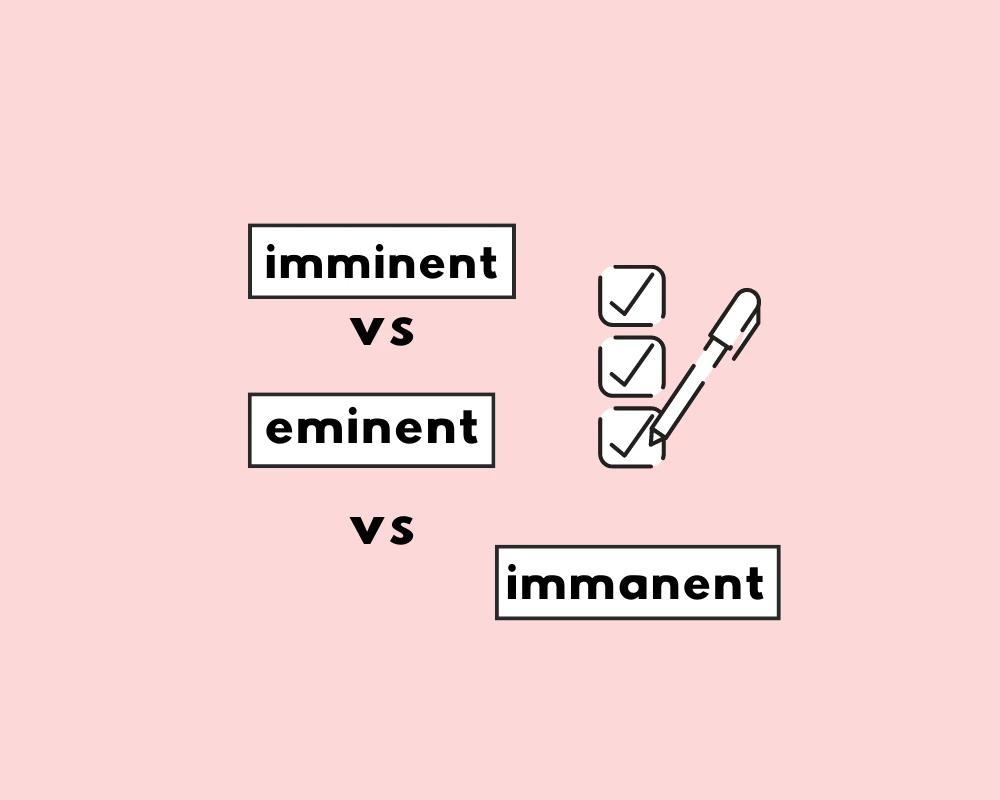
Imminent vs. eminent (vs. immanent)
For today’s lesson, we’re taking on a trio of homophones: eminent, imminent and immanent. What do these words mean, and what’s the correct way to use them? Let’s discover the answers, together.
The eminent scholar was invited to speak at the international conference.
The government issued a warning about the imminent hurricane.
We eagerly awaited the arrival of the imminent author.
The flickering lights suggested eminent power failure.
What do imminent/eminent/immanent mean?
Besides the shared etymology of these words, they also all happen to be adjectives or describing words. That said, the meaning of each is different, and so they are not interchangeable with each other (and each should be used in the appropriate contexts). Let’s take a look at the dictionary definitions for imminent/eminent/immanent:
- For something to be imminent, this means it’s “coming or likely to happen very soon: “an imminent disaster/danger“; “We are awaiting their imminent arrival“.
- Eminent describes something or someone as “famous, respected, or important: “An eminent historian“; “many eminent surgeons are on the hospital’s staff“.
- Something that is immanent means, “that the thing has that quality, and cannot exist or be imagined without it.” (Collins Dictionary, immanent). For example, ‘beauty is not something imposed but something immanent‘—Anthony Burgess
Imminent, eminent and immanent
| Word Form | Examples |
|---|---|
| Present Participle | 1520s, from French imminent (14c.) and directly from Latin imminentem (nominative imminens) “overhanging; impending,” present participle of imminere “to overhang, lean towards,” hence “be near to,” also “threaten, menace, impend, be at hand, be about to happen”.
“Indwelling, remaining within, inherent,” 1530s, via French immanent (14c.) or directly from Late Latin immanens, present participle of immanere “to dwell in, remain in,” from assimilated form of in- “into, in, on, upon” |
| Other | Adjective Sentence examples imminent eminent immanent The company had to take swift action due to the imminent threat of a hostile takeover. With the volcano showing increased activity, the town’s residents were worried about the imminent eruption. The doctor warned the patient to make immediate lifestyle changes to prevent the imminent health crisis. The city’s skyline is dominated by the towering presence of an eminent skyscraper. |
In review: imminent vs. eminent vs. immanent
- “Eminent” describes someone or something of high reputation, distinction, or significance within a particular field or context.
- “Imminent” describes something that is about to happen very soon, often suggesting a sense of urgency or impending occurrence.
- “Immanent” refers to something that is inherent, intrinsic, or existing within something else, often in a spiritual or philosophical context.
Read about other commonly confused words
- Is it Elude or Allude?
- When To Use Infer vs. Imply
- What’s the Difference Between Invoke and Evoke?
- Is it Allot, A lot or Alot?
- Which is it: Allusion or Illusion?
- Insure, Ensure or Assure?
- Averse or Adverse?
- “Accept” vs. “Except”: What’s the Difference?
Sources
- Harper, Douglas. “Etymology of imminent.” Online Etymology Dictionary, https://www.etymonline.com/word/imminent. Accessed 11 August, 2023.
- Harper, Douglas. “Etymology of eminent.” Online Etymology Dictionary, https://www.etymonline.com/word/eminent. Accessed 11 August, 2023.
- Harper, Douglas. “Etymology of immanent.” Online Etymology Dictionary, https://www.etymonline.com/word/immanent. Accessed 11 August, 2023.
Worksheet
According to the post, what does the word “imminent” mean?
Which of the three words is used to describe a person who is famous and respected, based on the post?
The post describes “immanent” as meaning that a quality is inherent and the thing cannot exist without it. Which phrase below uses “immanent” in this sense?
The post highlights “We eagerly awaited the arrival of the imminent author” as an incorrect usage. Why is it incorrect?
Which word does the post use in the example sentence: “The conference featured talks by _______ scientists from around the world.”?
The government issued a warning about the hurricane.
The scholar was invited to speak at the international conference.
Beauty is not something imposed but something , as quoted in the post.
We are awaiting their arrival.
Many surgeons are on the hospital’s staff.
FAQs
What does the word ‘imminent’ mean?
+
What does ’eminent’ mean?
+
What is the meaning of ‘immanent’?
+
Can you use ‘imminent’ and ’eminent’ interchangeably?
+
What is a common mistake with these words?
+
Yash, D. "Imminent, Eminent, Immanent: Explained, Definitions & Examples." Grammarflex, Jun 25, 2025, https://www.grammarflex.com/imminent-eminent-immanent-explained-definitions-examples/.










